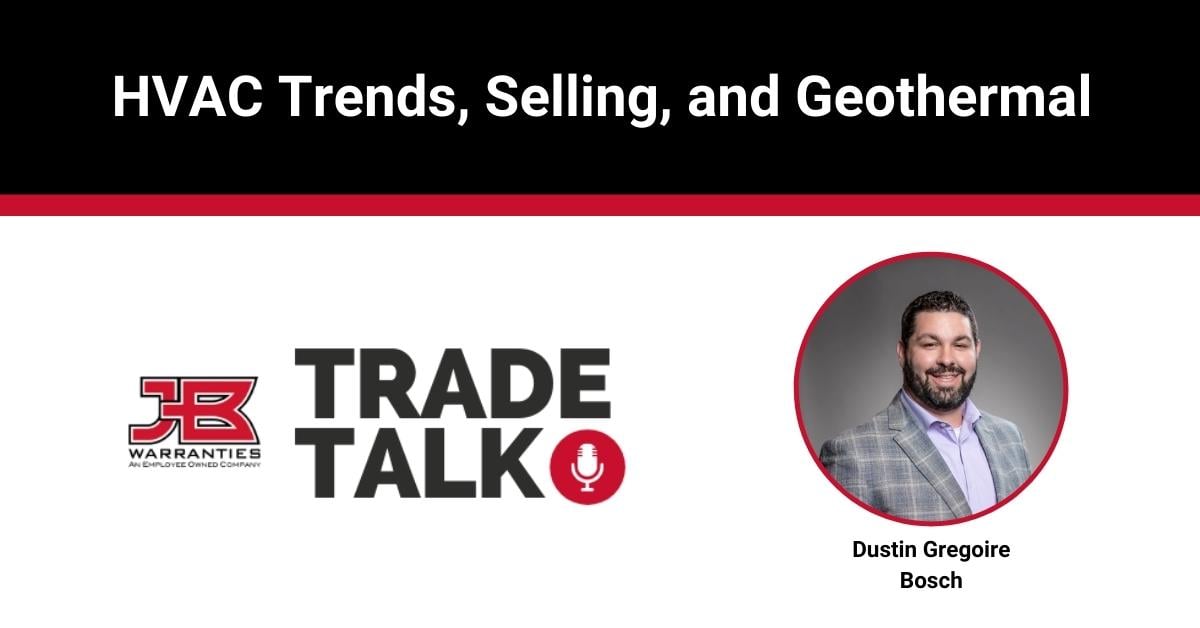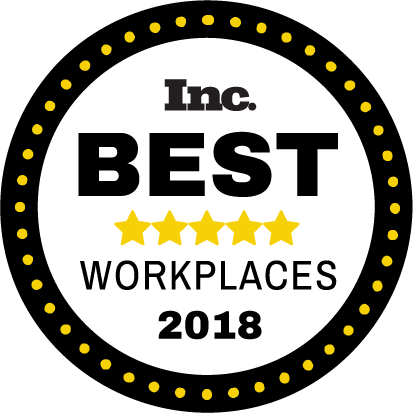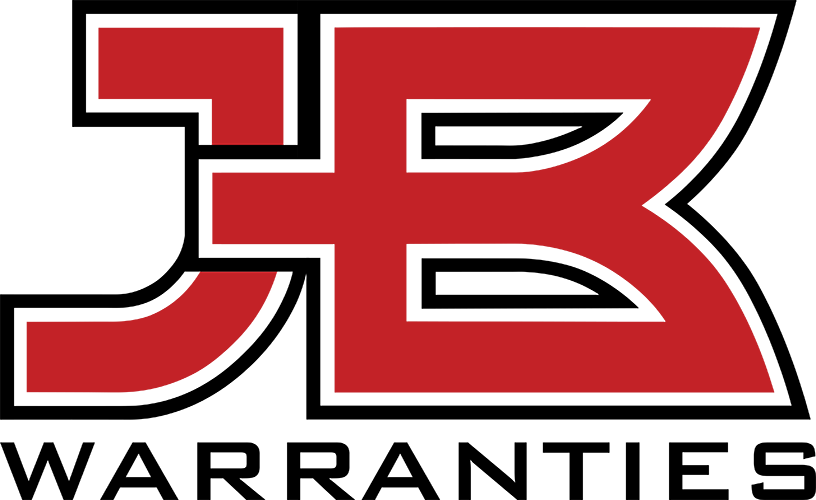
On this episode of Trade Talk, Dustin Gregoire, a National Sales Manager from Bosch, joins us to share some of his insights on several topics. He's been in the HVAC industry for a while, so he knows a thing or two about a lot of different areas.
Here's a breakdown of what you'll learn:
- What it's like working for a global company.
- Dustin explains why their identity of "high volume provider of niche products" and slogan "Invented for life" is key to their success.
- Purchasing HVAC trends.
- What contractors want from distributors.
- How IoT has impacted the HVAC sales process.
- The Next BIG thing in HVAC.
- Benefits of geothermal systems.
- Should contractors offer geothermal systems?
Connect with Nick, Brian, and Dustin:
Hosts:
Nick Ahrens and Brian Bohannan
Guest:
Dustin Gregoire, Bosch
Read the transcript:
Nick Ahrens: Hi there and welcome to JB Warranties' Trade Talk. My name's Nick Ahrens. I'm the National Accounts Manager here at JBW. And today we're going to be talking with Dustin Gregoire, the National Sales Manage at Bosch. Dustin, will you introduce yourself?
Dustin Gregoire: Absolutely. Thanks for having me on. Again, my name's Dustin Gregoire. I'm the National Sales Manager for Bosch Thermotechnology. I manage our residential HVAC portfolio. Been with Bosch for 19 going on 20 years, in a variety of different roles. Many people may not know, but Bosch is a multinational company, a lot of different products. So our division of Bosch in the US represents tankless water heaters, boilers, geothermal heat pumps, air source heat pumps, ductless mini splits. So all of that falls under our umbrella and I manage the residential air conditioning portion of that portfolio.
Nick Ahrens: Excellent. Thanks, Dustin. Can you tell us a little bit about what it's like working with a global conglomerate like Bosch?
Dustin Gregoire: Yeah. Bosch, it's a unique company. We're a melting pot of associates worldwide and no exception locally. So we have people from all walks of life, all different countries, working within our division, as well as different backgrounds, automotive, power tools, appliances. So it's a unique experience and it helps us bring better products to the market or have a more open mind about the development of products focusing on noise abatement or different things like that, that are important on the appliance side, but maybe have been historically ignored on the HVAC side, for example.
Nick Ahrens: Right. Great. So one of the things that separates Bosch from other manufacturers is they're engineering. Can you tell how that philosophy is helping Bosch fill needs that other manufacturers and brands may not be?
Dustin Gregoire: Yeah. The thing for Bosch is I think we recognize what our identity is and at least what it's been. And it's been to be a high volume provider of niche products. So our focus is to bring products that are invented for life is kind of our slogan. And what does that really mean? It means that improves some aspect of our lifestyle, whether or not it be comfort within the home, whether or not it be the acoustics within the home or outside the home, the longevity of products, the efficiency of products, which reduce costs. So all things that go into our design. You should expect to have any one or multiple level of those factors taken into consideration on products that are designed and engineered by Bosch.
I kind of go back to that niche portion of my comment, predominantly, we don't focus in that lower efficiency, more budget type range of products, whether it be on the HVAC side, on the boiler side, or certainly on the hot water side where we only offer gas, tankless water heaters, electric tankless water heaters, not on the tank. So I think that's the big value we bring on the engineering side. It's a little bit different than what other manufacturers do. They focus in a specific area, HVAC products let's call it. And they go from budget equipment to high efficiency, high value equipment. That's our slightly different approach to engineering and delivering products.
Nick Ahrens: Great. So what type of trends have you been seeing over the last year or two when it comes to purchasing an HVAC system?
Dustin Gregoire: Purchasing an HVAC system over the last year, availability's been a key component, right? So what can my contractor get for me as a homeowner? And then for you the contractor, what can my supply house provide to me? And then for the supply house, what manufacturer can get me a box so I can sell it to Mrs. Jones, that's asking for it? So the biggest thing that I've seen, and with that time log, if you will, is people going away from sole source suppliers, manufacturers, and having multiple options in their portfolio. A, so that way they're improving their product knowledge on those products before they need them. They're going out and proactively selling one or two brands versus one only. And that's been a huge trend within the industry.
We see it on the ductless side. We certainly see it on the unitary side with the growth that we've had on our Bosch inverter air source lines. So that's a big trend I've seen. The other thing that we've seen brewing, but it's becoming much more prevalent is the electrification, really across the country in the Northeast, we see areas that are not running any more gas lines. We've seen movement to heat pumps, whether it be in New York or Massachusetts. Down here in Texas, we had the great freeze of 2020, or 21 actually, was it not February this year?
Nick Ahrens: Yep.
Dustin Gregoire: So ensuring that the infrastructures are set up to support the markets and the growth that we have. Everybody talks about production side issues, or supply side issues, production side issues. We don't really focus so much on what we can do to curb what those demands are on the other side. We talk about high efficiency equipment, but people really don't get behind it. So I think we'll start and continue to see additional pushes for higher efficiency equipment, whether it be through the federal government, state, and local governments, or even electric utilities and gas utilities that need to mitigate some of those high demand peak time demand for natural resources.
Brian Bohannan: You almost have to. I think down here in Texas, when we found out that the grid couldn't support all of these older systems that are probably inefficient and a big drain on the grid overall, I wouldn't be surprised to see some rebates, some incentives to move towards this high efficiency stuff where you guys are kind of positioned to do well.
Dustin Gregoire: And you've also seen, maybe where in the past it was a fad. People wanted higher efficiency equipment, but it was more of it's something I want. And now I think it's more here to say, and there's more of an authentic effort to reduce operating costs and demand on the system and really prolong your comfort and your neighbor's comfort. It has to be taken into consideration, not just on the add-on and replacement side, but also on the new construction side, because that's where arguably the biggest impact can be made. 3,000 homes going in, can we make them all high efficiency versus one unit at a time, your house, my house, Nick's house. Right?
Brian Bohannan: You see people saying, "I want live near a power grid or a power station so if something happens." Well maybe now it's, "I want to live in a new built community where it's all high efficiency. Everything's state-of-the-art. That wouldn't be a shock to see, I don't think.
Nick Ahrens: Yeah. Really influencing overall trends like that, like you said, sort of one offs the larger development type stuff. As far as the industry's changing a little bit, what are you seeing contractors wanting from distributors? How are distributors keeping their customers and contractors happy and growing?
Dustin Gregoire: Yeah. You're asking the wrong guy in terms of what contractors are looking for from the distributors. These are the guys that would tell you what they want. What I would say is the expectation should be service, that, that wholesaler has access to resources for training, from manufacturers they have access to get information from manufacturers regarding new products, technologies, product availability, component availability, future risks. So I think the opportunity for you, the contractors, to hold your distributors accountable and work with the guys that are able to provide you that value and that service.
And be willing to pay for it. I hear a lot of complaints in the market where a contractor may jump across the street. He's getting a price that's two or 3% better. Okay, yeah, maybe you save 30 or 50 or $100, but if you're going to a supply house that's not able to service your needs on a Saturday, and now you've got a guy on a job site and he's costing you X number of dollars out there, that's where that extra value comes from, the supply houses that answer your phone and provide a different level of service. So it shouldn't just be about price. It should be what they're bringing to you to help you mitigate your risks when you have problems.
Nick Ahrens: So have you seen the internet of things? Is it impacting how the HVAC industry approaches the selling process?
Dustin Gregoire: Yeah. IOT, you're seeing a lot of the connected products bringing different value to the marketplace. So it's definitely a growing trend. I alluded to our engineering team and different walks of life, different products and backgrounds. So you'll likely see some of our products in the future have some level of connectivity. That connectivity isn't for us, it's for you. The goal is for you to be able to check your suction and pressures and different things from your shop before you send out a technician, or before you decide which technician you actually want to send out with the right part. So I think the IOT side of things will help the trades if you accept it, if they adopt it and then utilize it the way it's intended to be used.
It may not be for every application, but how do we make the most of our opportunities to get into that customer's house and optimize our time while we're out there. If we can shave 10% of waste or increase 10% of productivity of our teams, it makes us that much more profitable and successful.
When it comes to just retail in general, I think the industry, the professional trades industry has, to be prepared for some level of introduction of trades and sold services through Amazon or some other online platform. We see it in brick and mortar retail, Lowe's, Home Depot, other hardware type stores where you can buy an air conditioner or a water heater installed as a service. We've all seen the growth trend and the trajectory of Amazon. And you can sit at home and order your dog food at six o'clock at night, when you forgot to get to the grocery store, you don't want to get out. I see the same parallel happening in the trades. "Hey, my water heater went out. It's eight o'clock at night. I'm going to schedule a service appointment on Amazon Prime." And one of you, ideally, are going to reap the benefits of that additional sales lead.
Nick Ahrens: Great. I think you actually kind of just mentioned most of it, but what do you picture as the next big thing in the HVAC industry?
Dustin Gregoire: It all has to do with things connected and the evolution of the trades industry. It's going to be more connectivity, things that make you more productive once the technologies are adopted and out there. So that's going to be a integral thing to manufacturers, success and growth, but also to the contractor. Talked with a lot of guys. It's not the way my granddad did it. When they look at a unit, that control board would scare them or scare their parents, or first generation owners of the companies. But we're getting two and three and four generations deep and we're seeing a need and demand from the market, from the contractors, to have that ability to increase their productivity.
We were talking before about one of the challenges to you, the contractor, and it's the availability of skilled labor. So the more we can make you productive from your office, and see what's going on with the unit at a home, the more efficient you are in servicing that home, getting the customer up and running quicker and doing it at a less expensive cost or less overhead for your organization.
Brian Bohannan: It also introduces a preventative aspect to this home service repairs. If these systems are all connected, you can forecast or see ahead of time a problem coming, get someone out there proactively and avoid repair costs, the need for all this labor and the shortage of labor and disconnected systems, is really a solution that I think is necessary and will really benefit everyone evolved, from the homeowner and the repair cost, the contractor trying to dispatch people out there, knowing which one to send out there, knowing the problem before you walk in the door, increasing the efficiency in that manner. Looking forward to seeing some of this stuff come down the pipe.
Dustin Gregoire: Yeah. It's kind of interesting you bring up preventative maintenance. One of the things that we talk about internally at Bosch is predictive maintenance. It's big on the automotive side of our business. Preventative maintenance is, "Hey, I have a car and my car tells me at 3,000 miles, I need to change the oil," or 5,000 miles or whatever the number is. Predictive maintenance says the viscosity in the oil is X, and therefore it's fine for another 500 miles or another 1,000 miles.
There's different technologies out there that'll detect slight noises in a compressor or in a gear box or something that'll say, "Hey, something's wrong here, so you need to go do some level of service." So these type of technologies are going to be out there and help you proactively reach out to your homeowner and say, "There's nothing wrong with your system today, but we need to come out and check for these things that could happen in the future." And that's where things are going. That's what homeowners want, right? We're a society of convenience and instant gratification. So if you can proactively go out to Mrs. Jones' home and tell her that there's no imminent threat, but in the next year, you're probably going to have some challenges, so let's do this and that proactively, that takes a lot of the challenge angst away from arriving at a home where a customer's without heat or cooling, and it's 100 degrees outside.
Nick Ahrens: Yeah. Really does make a difference. And I think if contractors adopt that efficiency that they can get from the more and more knowledge it's going to do nothing but help their margins and help their business in the long run. All right. So Bosch has some geothermal units. What do you think the main benefits of the geothermal systems are?
Dustin Gregoire: There's certainly several. Efficiency's got to be at the top of the list. When you talk about geothermal equipment, you're talking about products that oftentimes achieve well above 35, 40 C or more often than not, they're measured in EER, not SEER because SEER is a seasonal rating based on an outdoor air temperature, where an EER is a finite measure, regardless of what the outside air of temperature is. Why is that important? Geothermal equipment's installed generally inside your home and you're using water to move the energy. And that water is a controllable temperature or medium to move the energy in.
So efficiency is certainly one of them. Longevity. Generally, AHRI publishes information that says geothermal heat pumps last nearly twice as long as what traditional equipment does. And then you have some level of noise and aesthetics. Most geothermal heat pumps are installed inside a home, whether it be up in your attic or in a basement or crawlspace. So you're taking all the equipment from the outside of the house, bringing it on the inside of the house. So you're getting the acoustical values of taking that condenser from outside and putting it inside. You're also getting the longevity associated with removing something from the elements and moving it in inside to a more controlled and conditioned environment.
Nick Ahrens: Great. So do you think that any given contractor should offer geothermal systems as part of their packages, or is it for someone who's really specializing in geothermal?
Dustin Gregoire: There is a unique amount of experience that's required to install geothermal equipment. The air flows the same, the sizing's the same, as unitary equipment or arguably the same. The challenge or the voodoo, if you will, is out there in the ground. It's, can we do the ground loops successfully? What I would argue and what I would tell you is there are plenty of looping contractors out there that will handle everything right up to the tie in to the equipment. So yes, I do think anybody and everybody could sell and quote geothermal. But get yourself some help. Reach out to the looping contractors, get an idea of what the cost of the loop will be and have them give you that quote to tie into your piece of equipment. So you do what you do well, which is size and sell equipment, set the equipment, hook up your duct work and do all the stuff that you're comfortable with and then have that price and have that background knowledge of what it's going to take for the looper to do his side.
Personally, don't limit yourself on what a customer can or can't afford. We talk about fresh air and different types of indoor air quality products. We talk about higher efficiency equipment. Maybe it's not geothermal. Maybe we know we can't get geothermal into a certain market, into a certain yard, but don't just assume that they want to quote on a 14 SEER piece of equipment. Give them several options and let them choose. And oftentimes, what you're going to see is a contractor, by giving several options, very few people actually want the cheapest piece of equipment or the cheapest quote. So you're going to give them a six or $7,000 quote for a 14 SEER unit, a $10,000 quote for an 18 SEER and maybe a 15 or $18,000 quote for 22 SEER, 24 SEER equipment. Most people are going to look at that and they're going to say, "Well, my biggest value is going to be right there in that middle range." And you'll sell more higher efficiency equipment. That boosts bottom line and the money that you make on every job.
Nick Ahrens: Great. Thank you. So that's all we have today. Dustin, thank you for joining us for JBW Trade Talk. We look forward to talking with you more.
Dustin Gregoire: Thank you. Appreciate the time.
Nick Ahrens
National Account Manager






